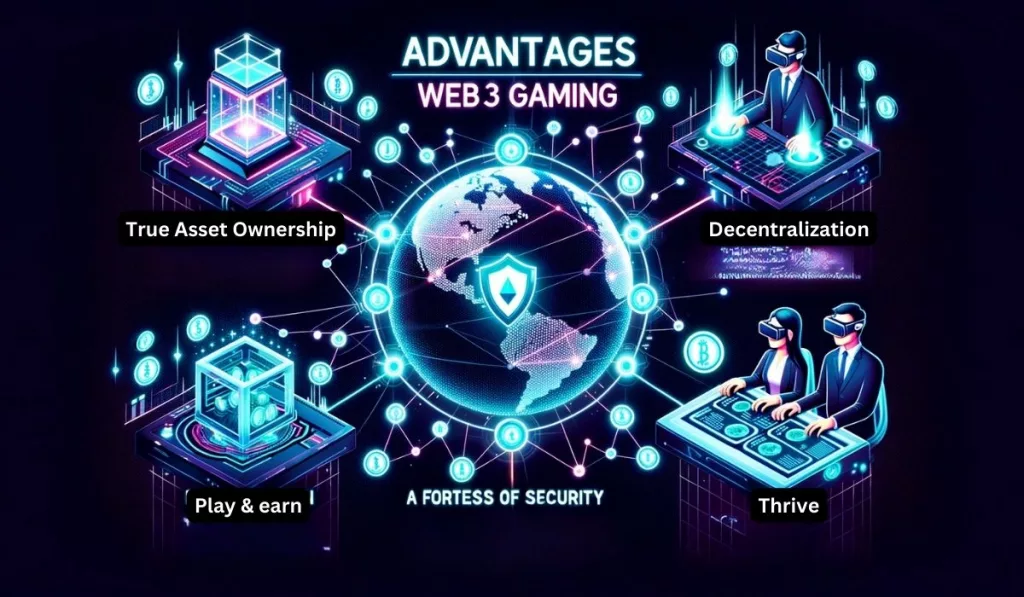Hello fellow tech enthusiasts! As we venture deeper into this new era of digital evolution, there’s a buzzing term you might have heard of – Web3. Now, I bet you’re wondering, “Is Web3 truly the future of gaming?”
Well, let’s embark on this enlightening journey together and decode the transformative potential of Web3 gaming. Let’s unravel how our favorite pastime (and for some, profession) is heading toward a more decentralized, secure, and immersive experience.
You must like our trending blog Top Web3 Game Development Firms in NYC, USA
What Exactly is Web3 Gaming?
For those slightly out of the loop, Web3 is the third era of web development. While Web1.0 was static, and Web2.0 brought us the interactive, social internet of today, Web3 offers a decentralized internet. In simpler words, it’s about handing the power back to the users.
Now, translate that into gaming. Web3 gaming is more than just a trend; it’s an evolution. Here, players have genuine ownership of their in-game assets, thanks to blockchain technology. Imagine owning that mythical sword you just acquired in a game, truly owning it, and having the option to trade, sell, or showcase it as you please.
Advantages of Web3 Gaming
Unlike traditional gaming platforms where the game’s assets and rules are controlled by a central entity, Web3 gaming allows for shared ownership and governance among players. This shift introduces a myriad of advantages that could redefine the gaming landscape. Here are several benefits associated with Web3 gaming:

1. True Asset Ownership: The Key to Your Gaming Kingdom
Think back to the days when trading cards were all the rage. You owned that holographic card, and you could trade, sell, or flaunt it as you wished. Now, imagine having the same freedom with your digital game assets. That’s the magic of Web3 gaming.
In old-style games, the cool outfits, strong weapons, or fun characters you get stay in that game only. It’s like you’re just “borrowing” them.
But with Web3, it’s different. Now, these items are not stuck in one game. They are tied to a special online record called a blockchain, which means they’re truly yours.
Remember that limited-edition armor you worked so hard to get? With the rise of Web3 gaming trends, you could soon strut that in multiple gaming universes, making your digital presence even more formidable. It’s like having a universal passport for your gaming assets.
2. Decentralization: Handing the Power Back to You
I’m sure you’ve been there: a game you love makes a sudden rule change or tweaks its in-game economics, leaving you perplexed and, at times, frustrated. These changes often come from the top down, decided by a centralized authority.
Enter Web3 and its decentralizing charm. This isn’t just a tech buzzword; it’s a shift in power dynamics. No longer are decisions exclusively in the hands of a few. With Web3 games, communities, and players like you, get to weigh in on the game’s evolution. It’s democracy in digital action.
3. A Fortress of Security and the Glass House of Transparency
At the heart of Web3 gaming is the blockchain. I know, “blockchain” can sound intimidating, but let’s break it down. Imagine a fortress – impenetrable and secure. That’s the kind of security blockchain brings to the table.
Have you ever been wary of making in-game transactions, fearing unauthorized breaches or fraud? With blockchain, those worries melt away. Your transactions are as safe as they can be.
But security isn’t the only perk. Transparency is the other side of the blockchain coin. Imagine a glass house where you can see everything happening inside. Every action, trade, or transaction is recorded and can be viewed by anyone. It’s honesty and openness taken to a whole new level, giving you peace of mind.
4. Play, Earn, Thrive: The New Gaming Mantra
Let’s get real for a moment. Who wouldn’t love to earn while playing their favorite game? With Web3, the line between play and profit blurs.
Web3 games often revolve around token-based economies. These tokens aren’t just arbitrary points; they hold real-world value. That epic dragon you just slayed? It could net you a token that you can trade or sell. It’s a tantalizing proposition: your in-game activities can now bear fruit in the real world. It’s not just about the thrill of the game anymore; it’s also about potential profit.
Web3 Gaming in Action: A Few Examples
Now, let’s put some skin in the game. Here are some Web3 gaming examples that showcase its potential:
1. Decentraland: Where Virtual Real Estate Dreams Take Flight
Have you ever fancied yourself a real estate mogul? But instead of sprawling acres, your kingdom is a vast digital landscape. Welcome to Decentraland, a realm where buying, developing, and selling virtual plots isn’t just a game—it’s an investment.
Ownership That’s Truly Yours: At the heart of Decentraland is the concept of true asset ownership. When you buy a plot of virtual land here, it’s recorded on the blockchain. This means you truly own that piece of digital real estate. No one can take it away from you. And given the growing popularity of virtual spaces, that tiny piece of digital land could be worth a significant amount someday.
A Canvas for Creativity: Beyond just ownership, Decentraland offers its residents the tools to build and create. Want to set up a digital art gallery, a music venue, or maybe an intricate maze? The only limit is your imagination. By creating unique experiences on your plot, you increase its value and appeal to potential visitors.
Real Transactions, Real Profits: The kicker? The monetary exchanges in Decentraland have real-world implications. The virtual land you sell or the tickets you charge for an event on your plot can translate to genuine profit. It’s a digital wonderland with tangible benefits.
2. The Sandbox: Crafting, Creating, and Cashing-In
Imagine a vast digital sandbox where the only boundary is the horizon. Now, add in tools that let you craft your universe. That’s The Sandbox for you—a community-driven platform that’s as vast as the collective imagination of its users.
Community at its Core: The Sandbox is not just about playing; it’s about creating and sharing. Players can build game scenarios, design unique experiences, and then share them with the community. It’s a collaborative space where the term ‘multiplayer’ takes on a whole new meaning.
Monetize Your Mastery: As with any sandbox, the most intricate castles draw the most attention. If you design a game scenario or a unique asset that becomes popular, you can sell it! Players have made substantial amounts by selling their designs or even charging others to experience their crafted scenarios.
A Thriving Token Economy: At its heart, The Sandbox operates on its native token, allowing players to buy, sell, and trade within the game. This token-based economy means that your in-game achievements and creations can have real-world value.
3. Axie Infinity: Battles, Breeding, and Blockchain
If you’ve ever been smitten by the charm of pocket monsters and the thrill of battles, Axie Infinity will feel both nostalgic and revolutionary.
A New Kind of Creature: Axies, the central characters, are adorable creatures you can breed, battle, and trade. But here’s the catch: Axies aren’t just pixels on a screen; they’re blockchain-based entities. Each Axie has its unique DNA, which means they’re truly one-of-a-kind.
Battle to Earn: Engage in thrilling battles and earn rewards. These aren’t just digital badges but tokens with genuine value. The better you are at the game, the more you stand to earn.
The Breeding Economy: Breeding Axies is an art and a science. By understanding the genetic makeup of your Axies, you can breed rare and powerful creatures. These rare Axies can be sold in the marketplace for a premium, giving players a chance to earn substantial amounts.
Also read: Top Web3 Game Development Firms in NYC, USA
Looking Forward: Where Does Web3 Gaming Head From Here?
The momentum behind Web3 gaming is undeniable. As more app developers and entrepreneurs recognize its advantages, we can expect a surge in games built on this framework. But like any technology in its nascent stage, challenges remain. Scalability, user understanding, and interoperability between games are areas begging for innovation.
The Momentum is Real: The Rise of Web3 Gaming
The pace at which Web3 gaming is carving its niche is nothing short of meteoric. Here are the forces driving its growth:
- Recognition by Developers: As more gaming architects understand the boundless opportunities Web3 offers, we’re witnessing an influx of games that embrace this paradigm.
- Enterprising Spirit: Entrepreneurs see the financial and innovative potential of Web3 gaming. With tokenized economies and decentralized assets, the business models of gaming are being redefined.
- Community Empowerment: The decentralized nature of Web3 gives players and communities a significant say in game evolution. This democratic approach is attracting a vast and engaged player base.
Challenges on the Horizon: What Lies Ahead?
Like any burgeoning technology, Web3 gaming isn’t without its set of challenges. Some of the pressing issues include:
- Scalability: As more players delve into the Web3 space, ensuring that games run smoothly without lags or glitches becomes paramount.
- User Understanding and Adoption: Bridging the knowledge gap is essential. Players need to comprehend the nuances of Web3, from blockchain mechanics to the philosophical shifts in digital ownership.
- Interoperability: This is one of the pivotal challenges. How can a weapon or character from one game retain its value or functionality in another? Crafting seamless bridges between diverse gaming worlds is a task developers will grapple with.
The Silver Lining: Innovations Await
While challenges are aplenty, history has shown that obstacles often breed the most groundbreaking solutions. Here’s the optimistic outlook:
- Technological Breakthroughs: As the Web3 community grows, it will invariably attract brilliant minds. Solutions for scalability and interoperability are not just hopes; they’re on the horizon.
- Educational Initiatives: We can anticipate a surge in platforms, tutorials, and resources aimed at demystifying Web3 for the masses. This will expedite user adoption.
- Collaborative Approaches: Web3’s decentralized spirit encourages collaboration. Developers, players, and stakeholders will likely join hands to shape the future of Web3 gaming collectively.
Let’s Hear From You!
What are your thoughts on Web3 gaming? Excited? Skeptical? Got an idea brewing? Dive into the comments below and share your perspectives. Let’s engage, discuss, and envision the gaming realm of tomorrow together.
In Conclusion
Web3 is more than just a technological trend; it’s the next chapter in our digital story. As gaming, a domain close to our hearts embraces Web3, we stand on the cusp of an era where players wield more power, assets have real-world value, and the boundaries between the virtual and real blur like never before. The future of gaming is Web3, and what a thrilling future that promises to be!
Enjoyed the read? Spread the word and let’s ride the Web3 wave together.










Leave a Reply